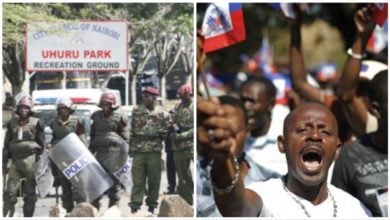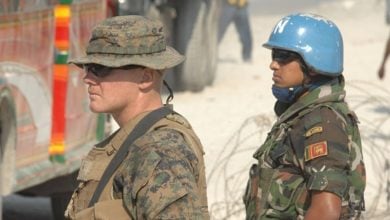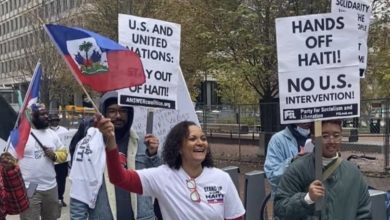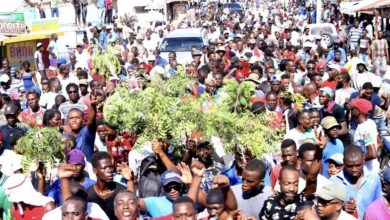On the morning of Aug. 24, Brazilian troops from the United Nations Stabilization Mission in Haiti (MINUSTAH) fired multiple rounds of heavy caliber ammunition in the neighborhood of Simond Pele. The UN troops were in four tanks. They fired at homes and buildings crowded with people inside. The cowardly attack was witnessed by members of an international delegation that was visiting the impoverished neighborhood within Cité Soleil.
The delegates’ mission in Simond Pele was to interview residents about allegations of recent attacks against the
 |
In an Aug. 25 press conference, the delegation reported that a UN bulldozer had blocked an entrance to the neighborhood with dirt. One of the delegates, Haiti Action Committee activist Ben Terrel, reported that the tactic was meant to “apparently block an escape route from the neighborhood.”
Such vicious attacks have characterized the occupation of Haiti ever since the U.S.-orchestrated overthrow of the democratically elected president Jean-Bertrand Aristide in 2004. For example, on July 6, 2004, some 300 UN troops murdered 26 civilians in Cité Soleil.
Murders, death threats rise
These are not isolated human rights violations. The respected British medical journal The Lancet published a report on Aug. 31 with statistics pointing to systematic human rights violations in Port-au-Prince.
The report analyzes the period between Feb. 29, 2004—the day Aristide was kidnapped—and December 2005. Its authors surveyed 1,260 households, or 5,720 individuals. The report revealed exceedingly high rates of murder, death threats, assaults, denials of due process, and sexual abuse, among other violations in Haiti’s capital.
The data compiled by the researchers indicate that, on average, 12 people were murdered each day during the period. Armed anti-Lavalas groups and their partisans, in conjunction with the Haitian National Police and other state forces, accounted for almost 50 percent of all identified perpetrators.
Of all the households interviewed, 7.6 percent claimed that a member of the household had been threatened with death. State forces and foreign occupation soldiers accounted for close to 40 percent of all death threats. Brazilian and Jordanian soldiers topped the list of troops who threatened Haitians with bodily harm.
Although the number of reported detentions by government or UN occupation forces was low compared to other incidents, most of the detentions violated the victims’ constitutional rights. Of the 36 detentions identified, only one person saw a judge within 48 hours as stipulated by law. Most never saw an attorney, and nine individuals are still incarcerated.
Report uncovers rampant sexual abuse
The number of people sexually assaulted is shocking. All reported incidents targeted Haitian women. In over half of the cases, the victims were younger than 18, and 16 percent were under the age of 10. Altogether, the report estimates that more than 35,000 women were sexually assaulted during the 22-month period.
Over 36 percent of all sexual assault victims were restaveks—children who work as domestic servants without pay.
|
According to the Haiti Action Committee, the majority of restaveks are sent to the cities from rural areas by their poor parents, who hope their children might receive food, education and shelter. Instead, the children often end up in abusive situations living in slave-like conditions.
The committee’s 2004 pamphlet Hidden from the Headlines points out that during Aristide’s presidency Haiti’s government passed legislation prohibiting the trafficking of persons and banned labor code provisions that sanctioned child labor. Scholarship funds for the child servants were set aside for 2003-04, and Aristide called on families housing restavek children to send them to school.
The coup d’état of February 2004 preempted the government’s initiatives to improve conditions for the beleaguered restaveks. As the Lancet’s report reveals, the children are ever more vulnerable now, more than two years after the United States imposed its model of “democracy” on the impoverished nation.
The authors of the Lancet report acknowledge that their methodology may have led to an inaccurate estimate of human right violations in Haiti—the true picture may be much, much worse.
Only households in Port-au-Prince were interviewed, which cannot account for victims who fled the capital or those in other areas where it’s known that serious human rights violations have occurred, such as Cap Haitien and St. Marc. It is also possible that many of the individuals interviewed chose to remain silent for fear of retaliation from perpetrators.
The study also investigated only certain types of violations. For instance, identifying Haitians who were forcibly expelled from their homes, those who lost their jobs, or people who became refugees was not within the project’s scope. It is safe to assume that the grim statistics in the Lancet’s report do not represent the true extent of the crimes committed against the people of Haiti.
The situation in Haiti today is the product of the overthrow of Jean-Bertrand Aristide, a situation engineered by the U.S. government and its allies. The progressive reforms pushed by Aristide, however modest, did not please the local capitalists or the U.S. imperialists, who amass enormous profits by exploiting poor Haitian workers.
The 2004 coup was portrayed by the bourgeois media as a popular uprising when it was really the work of a handful of U.S.-sponsored thugs backed by American troops.
The people of Haiti have bravely resisted the occupation that followed and refuse to let their spirits be broken. The presidential election in February that ended in a victory for René Préval misled some liberals into believing that conditions in Haiti were improving.
But Haitians continue to suffer at the hands of UN troops; thousands of political prisoners still languish in Haiti’s jails. These facts provide undeniable proof that the imperialists are still firmly in power.
There cannot be self-determination under military occupation. The removal of all UN foreign troops from Haiti is a necessary precondition for the self-determination of the Haitian people.







